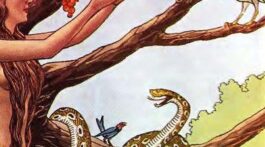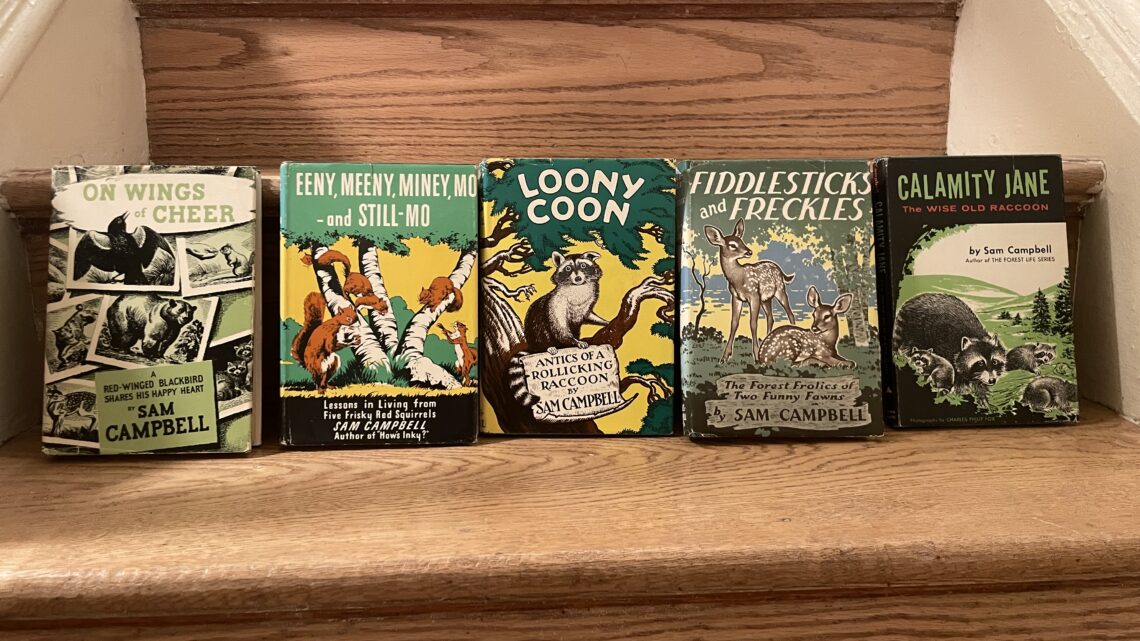Between 1945 and 1963, seven children’s books by American naturalist Sam Campbell were included in the Missionary Volunteer Junior Reading Course. The Missionary Volunteer Reading Course (sometimes referred to as a book club) was among the first programs instituted by the General Conference’s Young People’s Missionary Volunteer (shortened to MV) department created in 1907. Led by Milton E. Kern and Matilda Erickson, the MV’s literature committee’s goal was to develop “a taste for thoughtful, purposeful reading” which they believed to be “one of the best acquisitions for any young man or woman. It opens to them the whole storehouse of truth,— the facts of history, the achievements of science, and the wonders of revelation” (Youth’s Instructor, Sept. 7, 1909, pg. 2).
In the early years of the program, the selections focused on character development, beliefs of the Adventist Church, Christian church history, and missions. The program included different titles for senior and junior levels. A primary level was later added for the youngest students. Also in those early years, it was common to find titles written by non-Adventist authors. By the 1940s, however, the number of books written by Adventist authors for children and youth had greatly increased. Thus, the addition of Sam Campbell’s books was unusual, perhaps even unexpected.
Becoming the Philosopher of the Forest*
Samuel Arthur Campbell was born on August 1, 1895, in Watseka, Illinois. When Campbell was four years old, his parents, Arthur and Katherine “Kittie” Campbell, moved to Chicago with their children, which included brother Don and sister Lucille. The family continued to visit their country relatives each year and later made annual camping trips to wilderness areas. Eventually, they purchased their favorite camping site, including a small cabin, on the western shore of Four Mile Lake near Three Lakes, Wisconsin. Thus, Sam Campbell developed a love of nature early in life.
As a young adult, Campbell was restless and aimless. He enrolled at Northwestern University and later the University of Chicago, but he was not committed to any profession. He loved to write, but was embarrassed to still be living at home, supported by his father and brother.
Campbell was particularly close to his mother. Her great love for the wilderness led Campbell to call her Wegimind, an Ojibwe word for mother. When she died on June 17, 1927, it provided the catalyst for Campbell to retreat to the north woods of Wisconsin made so famous in his books.
The Campbells were non-denominational Christians. Wegimind had been uncomfortable with sectarianism and led her son to “a deep awe of the majesty, beauty and goodness of God,” but Sam Campbell “didn’t have many theological roots” (Henson, pg. 24). Now, alone in the wilderness and grieving his mother, Campbell spent time reading great literature and poetry, and the Bible. As he read about Jesus in the Gospels, he began to see evidence of God in nature. As his immersion in nature and the Bible healed his spirit, a desire grew in him to share his new discoveries with others. He renamed his family’s property “The Sanctuary of Wegimind” and began inviting people to join him for hikes and evening campfires. Happy social events that also included opportunities to share the spirituality, peace, and refreshment the wilderness offered. Campbell purchased additional property on Four Mile Lake, including the island that became his beloved home. He also began to write for publication.
Bobbs-Merrill Publishing and the MV Literature Committee
When or how Campbell’s writing came to the attention of the MV’s literature committee has yet to be confirmed, but it may well have been through his popular lectures. The first reference to Sam Campbell in Adventist periodicals dates to announcements of the upcoming November 11, 1939, MV Rally at Broadview Academy, Illinois. The Saturday evening entertainment featured “Mr. Sam Campbell” and “his beautiful color motion pictures and will give one of his thrilling lectures. We are very fortunate in securing Mr. Campbell and no one will want to miss this outstanding program” (Lake Union Herald, October 24, 1939, pg. 3).
The first of his Forest Life series for children, How’s Inky, was published in 1943. His second children’s chapter book, Too Much Salt and Pepper, published in 1944, was the first to appear in the MV Reading Course in 1946. Subsequently, his fifth book, On Wings of Cheer (1948) appeared on the 1949 MV Reading Course list. These engaging stories shared Campbell’s real-life experiences with nature and imparted his own brand of humor, wisdom, and spirituality, although the names and characterization of his friends who appeared in the stories were altered to protect their privacy. Yet, the books were surprising choices. Campbell may have been a Christian of sorts, but he was prone to include slang in his dialogue, and his publisher, Bobbs-Merrill, was a secular company.
The relationship between Bobbs-Merrill and the MV literature committee is a bit murky, but the committee minutes provide a few comments that are illuminating. If not earlier, by 1950 Bobbs-Merrill editors were willing to negotiate with the MV literature committee. They may have realized that they now had a quasi-captive market among Seventh-day Adventists to which they were willing to cater in the interest of book sales. When Moose Country (published and included in the MV Reading Course in 1951) was under consideration in January 1950, the MV literature committee reviewed an advance reader copy. The committee liked the story, but was concerned about the use of words such as “’Jeepers’ and sought counsel regarding such expressions as ‘swell,’ ‘heaven,’ ‘evolution’s answer,’ ‘I’ll bet,’ etc.” The committee’s final motion called for “the chairman [to] counsel with M. R. Thurber and E. B. Hare regarding any changes which he questions, and that they fill inlines [sic] which need to be deleted so that the paging will not be injured. Carried.” (MV Book Club Committee Minutes, January 25, 1950). In 1952 a similar discussion likely took place regarding The Seven Secrets of Somewhere Lake (included in the 1954 list), although it was only noted that the committee voted to accept the book subject to Bobbs-Merrill making the recommended changes (MV Book Club Committee Minutes, June 11, 1952).
However, the nature of the references to Bobbs-Merrill changed in the discussion of subsequent books such as Loony Coon (1955), Beloved Rascals (1958), and Calamity Jane (1963), the last three Forest Life books to be included in the MV Reading Course. The minutes only note that “negotiations” and “proper arrangements” needed to be made for distribution and release. (MV Book Club Minutes, August 23, 1957, and December 12, 1961). These negotiations and arrangements entailed a license agreement that allowed the Pacific Press Publishing Association to simultaneously release special additions of these books with the offensive words removed. In fact, this may be what had been happening all along as Pacific Press eventually printed all twelve books under their original copyright dates. Wings of Cheer was also serialized in the Youth’s Instructor in 1956. Moose Country was serialized at least in part in 1959.
The MV literature committee believed it had “a serious responsibility in guiding the reading habits of our youth” (1948 Reading Course Announcement). When a reader wrote to the Youth’s Instructor inquiring as to the difference between the secular and Adventist editions of Sam Campbell’s books, she received this answer:
Inasmuch as Mr. Campbell is not a member of the Seventh-day Adventist Church it is only natural that some of his expressions of speech, generally acceptable in the world, would not be considered advisable to pass on to our readers. Expressions often referred to as slang, or more accurately as mild expletives or swear words, were deleted in the Seventh-day Adventist editions. (Youth’s Instructor, December 11, 1956, pg. 2)
However much or little was understood about the different editions at the time, the distinction has since been lost. In subsequent decades, copies of either edition have remained beloved by Adventist fans who only recognize the author’s name and titles of the books.
On the Lecture Circuit
The MV Reading Course was not Adventists’ only contact with Sam Campbell. From around 1929 until his death in 1962, Campbell regularly presented public lectures about nature and conservation, illustrated with his own motion pictures and photography. The Chicago and Northwestern Railroad sponsored his lecture tours for twenty-two years in the interest of promoting tourism in the North Country of Wisconsin. Campbell had mixed feelings about this, wanting people to experience the joy he found there, but also wanting to protect the place. It was these winter lecture tours that brought him face-to-face with countless Adventists.
Prior to the addition of Too Much Salt and Pepper in the 1946 MV Reading Course list, Campbell’s appearances at Adventist events seems to have been limited to the Illinois Conference. As the 1950s progressed, he was frequently invited to speak at Adventist schools throughout the Lake Union, Northern Union, Central Union, North Pacific Union, and Pacific Union. During the year 1956 his appearances were particularly numerous. Just one example is the College of Medical Evangelist’s Share Your Faith Rally held January 13-14, 1956. Sam Campbell was the Saturday evening entertainment as reported in the pages of the Youth’s Instructor:
However, there were more thrills yet to come. That night in the San Bernardino Municipal Auditorium, a record crowd filled the pavilion to hear Sam Campbell, nature philosopher, who made a personal appearance and showed his colored motion picture, “North Country—Land of the Voyageur.” (Youth’s Instructor, May 22, 1956, pg. 4)
Sam Campbell’s life came to an abrupt end on April 13, 1962, when he suffered a massive heart attack. His legacy lived on as the Pacific Press and later A. B. Publishing reprinted his books, and children still learned to love nature through his eyes.
*This section was abstracted from Shandelle Marie Henson, Sam Campbell: Philosopher of the Forest (Three Lakes, WI: Three Lakes Historical Society, printed by TEACH Services, Inc., 2001, 2002).









